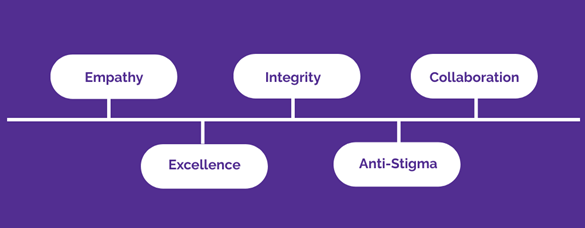Our strategy
Supporting people affected by
all types of psoriasis, advancing care,
driving research and enhancing
advocacy and public awareness.
 Our Strategy
Our Strategy

As we celebrate our 60th anniversary, the Psoriasis Association reaffirms its commitment to supporting people affected by all types of psoriasis, advancing care, and driving research.
Over the last six decades, we've been at the forefront of empowering patients, advocating for better care, and funding crucial research.
Our Vision
We envision a future where everyone affected by all types of psoriasis lives a healthier, more confident life, free from stigma, with access to effective care, treatment, and support – while we continue to strive towards a cure.
Our Mission
Our mission is to support individuals living with all types of psoriasis by advancing care, building a strong research base, and driving groundbreaking research forward to seek a cure.
We strive to foster an inclusive society where those affected are understood, empowered, and supported, free from stigma and discrimination.
The work we do is driven by 5 key values:

Our Five Strategic Priorities
Learn about our five core Strategic Priorities in the drop down tabs below.
1) Supporting People Affected by All Types of Psoriasis
Objective:
Enhance the support services and resources available to individuals living with psoriasis.
Actions:
- Expand high quality educational resources on managing all types of psoriasis.
- Strengthen online support communities and peer-to-peer connections.
- Launch campaigns focused on reducing stigma and raising awareness of the mental health impacts of psoriasis.
- Explore evolving the current membership model into a more flexible supporter model aimed at increasing donation levels.
- Leverage, enhance, and fully integrate advanced technologies to deliver information and support across a wide range of platforms and channels, while strategically utilising these opportunities to drive engagement and attract donations.
- Develop specialised resources for different age groups and demographics, including teenagers and young people, incorporating the findings of the Psoriasis Association-funded UK epidemiology research.
2) Advancing Care for People with Psoriasis
Objective:
Improve access to effective care and treatment for individuals with psoriasis, and ensure people are seen by the right person, in the right place, at the right time.
Actions:
- Advocate for improved policies to ensure equitable care for people with psoriasis.
- Nurture partnerships with healthcare providers to develop guidelines for optimal care.
- Collaborate strategically with key stakeholders (such as medical professional bodies, regulatory bodies and the pharmaceutical industry) to improve access to skilled healthcare professionals* and care for individuals with psoriasis, ensuring quicker and more efficient treatment.
- Promote the integration of psoriasis management into general healthcare, ensuring early diagnosis and treatment.
- Seek and utilise opportunities to ensure that healthcare professionals* are trained on the latest advancements in psoriasis care.
3) Driving Research to Improve Outcomes
Objective:
Accelerate innovative research to find new treatments and ultimately a cure for psoriasis.
Actions:
- Increase funding for psoriasis research across all areas through targeted grants and strategic partnerships
- Support collaborative research initiatives with universities, hospitals, and appropriate partners.
- Continue to encourage and fund research to address the James Lind Alliance Priority Setting Partnership on Psoriasis Top 10 Research Questions and assess the progress made in answering these questions. Consider involvement in research looking at the psychosocial impact of psoriasis and how to improve quality of life. Support research into stigmatisation of people with psoriasis and strategies to manage this.
- Identify research gaps and commission research as appropriate.
4) Enhancing Advocacy and Public Awareness
Objective:
Raise the profile of all types of psoriasis to ensure that the voices of individuals affected are heard and respected.
Actions:
- Launch national campaigns to increase public awareness of psoriasis, its impact, and the stigma surrounding it.
- Build partnerships with other organisations, government bodies, and healthcare professionals* to advocate for policy changes.
- Work to reduce societal stigma around psoriasis through targeted media and public relations efforts.
- Elevate the voices of individuals living with psoriasis through patient-led advocacy programmes.
5) Celebrating 60 Years of Progress and Impact
Objective:
Commemorate our 60th anniversary (2028) by reflecting on our achievements and creating new opportunities for growth.
Actions:
- Host events and awareness campaigns throughout the year to celebrate our 60th anniversary and showcase our history of progress.
- Consider the advancements achieved over the past 60 years and highlight the future directions for psoriasis care and research.
- Engage with long-term supporters, donors, and stakeholders (these may include clinicians, researchers and the pharmaceutical industry) to highlight past milestones and future goals.
- Create a legacy fund dedicated to advancing research and improving the lives of individuals with psoriasis, while further combating stigma.
Read Our Strategy
View and download our 2025 - 2030 strategy.
I struggle to put into words how appreciated the efforts of the Psoriasis Association are by those of us living with psoriatic disease.
They see us and address our needs in ways others just don't.
Zoe, Psoriasis Association Member